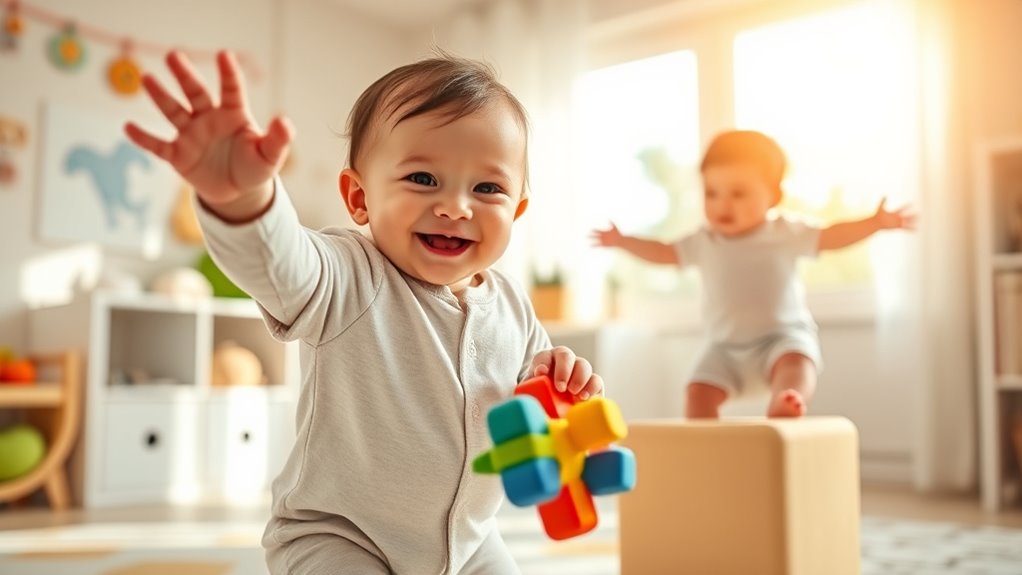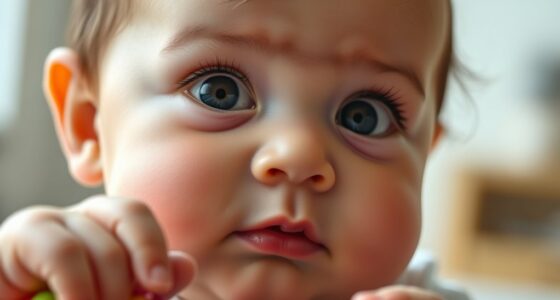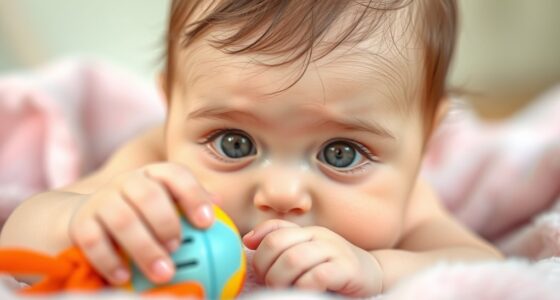Both gross and fine motor skills are crucial for your baby’s overall growth. Gross motor activities like crawling, walking, and jumping help them explore their environment and develop coordination. Fine motor skills, such as grasping and manipulating objects, support daily tasks and hand-eye coordination. Together, these skills boost sensory processing, confidence, and learning. Focusing on both areas creates a balanced foundation for their physical and cognitive development—keep going to discover more about nurturing these essential skills.
Key Takeaways
- Both gross and fine motor skills are essential for overall physical development and independence.
- Gross motor skills enable large movements like crawling, standing, and walking, supporting exploration.
- Fine motor skills involve precise actions like grasping and manipulating objects, crucial for daily tasks.
- Developing both skills enhances sensory processing, hand-eye coordination, and language milestones.
- Balancing activities for both types promotes well-rounded growth and boosts confidence in your baby.

Understanding the difference between gross motor and fine motor skills is fundamental for supporting a child’s development. These skills play a critical role in your baby’s overall growth, influencing everything from sensory development to achieving key language milestones. When you recognize how each type of motor skill contributes to their progress, you can better nurture their abilities and guarantee they’re developing on a healthy trajectory.
Gross motor skills involve large muscle movements that allow your child to move through space confidently. Think about actions like crawling, standing, walking, or jumping. These movements help your baby explore their environment, which is essential for sensory development. As they gain strength and coordination through these activities, they learn to process sensory input more effectively—touch, sight, sound, and even balance become clearer and more organized. This sensory integration is foundational for later skills, including language development. When your baby explores their surroundings through gross motor activities, they also strengthen their spatial awareness and gain confidence in their body, paving the way for more complex movements.
Gross motor skills enable your child to move confidently through space, supporting sensory development and overall growth.
Developing gross motor skills also supports spatial awareness and overall coordination, which are important for future physical and cognitive tasks.
On the other hand, fine motor skills involve smaller, more precise movements. These include grasping objects, pointing, picking up tiny items, or manipulating toys. Developing fine motor skills is indispensable for everyday tasks like feeding themselves, turning pages in a book, or using a crayon. These activities not only support physical dexterity but also impact cognitive and language milestones. For example, when your baby practices grasping and releasing, they’re refining hand-eye coordination, which is closely connected to language development. As they learn to hold and manipulate objects, they also develop the ability to imitate sounds, gestures, and eventually words. Fine motor skills help your child connect what they see with what they can do, fostering both sensory and language growth.
Both gross and fine motor skills are interconnected and support one another in complex ways. As your baby grows stronger physically, they’re better equipped to engage in activities that promote sensory development and language milestones. Encouraging a variety of movements—whether crawling across the room or picking up small blocks—provides essential opportunities for them to build these skills. Recognizing the significance of both types of motor development allows you to create a nurturing environment that promotes well-rounded growth. When you support your child’s motor development in a balanced way, you’re helping them become more confident, capable, and ready to explore the world around them.
Frequently Asked Questions
When Should My Baby Start Crawling and Grasping?
Your baby usually starts crawling around 6 to 10 months, but every child develops at their own pace. Encourage tummy time to strengthen muscles and improve hand-eye coordination, which helps with grasping. You might notice your little one reaching and grasping objects by 4 to 6 months. Be patient and supportive, offering plenty of opportunities for practice. Remember, early milestones vary, and every step is progress!
How Can I Tell if My Baby Is Developing Motor Skills Properly?
You can tell if your baby is developing motor skills properly by observing their muscle strength and coordination milestones. Watch for signs like holding their head up steadily, rolling over, and reaching for objects. Their movements should become smoother and more controlled over time. If you notice delays or difficulty in these areas, consult your pediatrician. Regular check-ups help guarantee your baby’s motor development is on track and healthy.
Are There Activities That Improve Both Gross and Fine Motor Skills?
You can support your baby’s development by engaging in motor skill activities that boost both gross and fine motor skills. Activities like crawling, reaching, and grasping toys help meet developmental milestones. You might encourage your baby to crawl towards a favorite toy, which promotes movement and coordination, or practice picking up small objects to enhance fine motor control. These combined activities foster overall growth and help your baby reach important milestones.
What Are Signs of Delayed Motor Development in Infants?
Like a ship’s captain watching the horizon, you should notice if your baby shows signs of delayed motor development. Look for poor muscle tone, such as limp or overly stiff limbs, and weak or absent reflex responses. Delays in reaching milestones like sitting, crawling, or grabbing may signal developmental concerns. Stay attentive, and consult your pediatrician if you notice these signs, ensuring early support for your baby’s growth.
How Do Motor Skills Influence My Baby’s Overall Learning and Independence?
Motor skills directly impact your baby’s learning and developmental independence. When your baby reaches motor skill milestones, they gain confidence to explore and interact with their environment. This exploration promotes cognitive growth and social skills. Developing both gross and fine motor abilities helps your baby perform everyday tasks, fostering independence. Supporting these skills guarantees your child’s overall development, enabling them to learn more efficiently and become more self-reliant as they grow.
Conclusion
Understanding both gross and fine motor skills helps you support your baby’s development. For example, when your little one learns to crawl (gross motor), they also start developing hand-eye coordination (fine motor). By encouraging activities like tummy time and stacking blocks, you’re helping them grow stronger and more skilled. Remember, nurturing both types of motor skills sets a solid foundation for your baby’s future learning and independence. Your active support makes all the difference!










